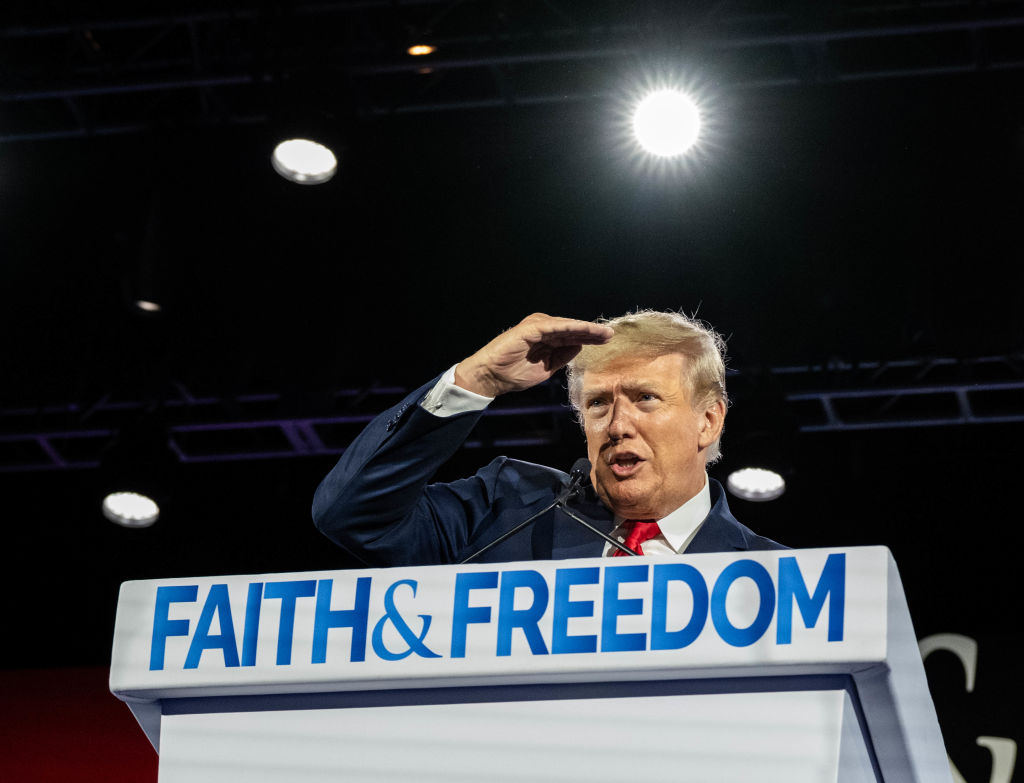
This article is part of The D.C. Brief, TIME’s politics newsletter. Sign up here to get stories like this sent to your inbox.
The Republican Party’s top presidential hopefuls are in Washington this weekend to woo voters that are both essential to their success in 2024 and potentially huge liabilities.
From a crassly political posture, the Faith and Freedom Coalition’s confab is a must-have booking for most of the field. The logical successor to the Christian Coalition, the group connects Evangelical Christians with Tea Party-style activists and is one of the potential kingmakers—or queenmakers—in the GOP’s current amalgamation of interests. But even the title of this year’s gathering—Road to Majority—is an implicit admission that the coalition’s membership is out-of-step with the country they hope to lead.
Former President Donald Trump, former Vice President Mike Pence, Florida Gov. Ron DeSantis, former South Carolina Gov. Nikki Haley, former New Jersey Gov. Chris Christie, Sen. Tim Scott of South Carolina, former Arkansas Gov. Asa Hutchinson, and entrepreneur Vivkek Ramaswamy are all slated to have their shot before the crowd, who are ardently opposed to abortion rights, marriage equality, and even medical marijuana. That makes them simultaneously niche and necessary for any serious Republican contenders. After all, it’s tough to play well in church-heavy Iowa if you skip a summit aimed at their grasstop leaders.
Yet, in the big picture, the turn at the Washington Hilton may not pack the punch it once did, especially in a country that has seen views change hugely on one of the coalition’s central agenda items. Even still, skipping it could prove politically lethal.
A bit of context.
In the weeks following last year’s midterm elections, we spilled a lot of smart ink on the rapid swing of support for abortion rights following the fall of Roe. With the ruling in Dobbs v. Jackson Women’s Health Organization fresh, women signed up to vote, volunteer, and donate at a clip that sent major worries around Republican circles. What had been an intense priority for a relatively small sliver of the electorate suddenly became Issue One, and not in the way that abortion opponents had hoped for.
After five decades of relentless dreaming that abortion would no longer be a federally protected right, came at a hefty cost for GOP candidates up and down the ballot. Despite a historically ripe environment, Republicans stumbled as Democrats made access to abortion a central issue of the campaign. Support for abortion rights is the highest it’s ever been. Opposition to abortion rights became—and remains—a huge problem for Republican candidates in head-to-head contests with Democrats. And, in a way that went unnoticed to most Americans, pushed the shrinking Republican Party into a more radicalized direction.
First, a needed caveat: exit polls have a baked-in imprecision. TIME’s Molly Ball has a must-read explainer on their shortfalls and limitations here. The key takeaway is that it’s difficult to know precisely how people conducted themselves in the privacy of the voting booth no matter how many people pollsters talked with on their way out of local election sites. With that out of the way, let’s look at the data we do have, and what we might extrapolate from it.
Among all voters, support for abortion rights had a huge spike after Dobbs. In 2020, exit polls found support for legal abortions among 51% of voters. Two years later—with the Supreme Court shaking loose a lot of ground in the interim—that figure surged to 60%. Among women, that climb went from 52% to 64%, an enormous swing in such a concentrated period.
But look at the voters who told exit pollsters they were Republicans. In 2020, 76% of Trump voters said abortion should be illegal. In 2022, 89% of Republicans shared that view. Among Republican women, the increase was roughly the same: a jump from 74% saying abortion should be illegal up to 87%. In other words, the Republican opposition to abortion rights hardened in the wake of Dobbs right at the moment when voters soured on that position.
This mismatch has huge implications for America and its ability for leaders to govern. A majority of Americans support legal access to abortion rights yet one of the major parties is unyielding in its opposition. The number of people who identify as neither a Republican nor a Democrat has grown from 26% in 2020 to 31% in last year’s exit polls, providing yet another proofpoint that confidence in government is ebbing to new lows.
All of this, of course, is on the minds of many of the hardcore conservatives gathered here in Washington. Many of the White House hopefuls will take their turn to cheer the end of Roe, the rise of Dobbs, and the Christian Right’s ambitious agenda. But as Dobbs hits its one-year anniversary on Saturday—with many of these self-described faith-informed voters giddy with its arrival—the country isn’t exactly with them. In fact, an NBC News poll timed to the anniversary found 61% of voters disapproved of Dobbs and 53% say abortion is now too difficult to access. Among Republicans, 31% say they opposed the end of Roe.
So these activists’ principled stand may serve them well on Sundays—but just not on Election Day.
Make sense of what matters in Washington. Sign up for the D.C. Brief newsletter.
More Must-Reads from TIME
- Cybersecurity Experts Are Sounding the Alarm on DOGE
- Meet the 2025 Women of the Year
- The Harsh Truth About Disability Inclusion
- Why Do More Young Adults Have Cancer?
- Colman Domingo Leads With Radical Love
- How to Get Better at Doing Things Alone
- Michelle Zauner Stares Down the Darkness
Write to Philip Elliott at philip.elliott@time.com